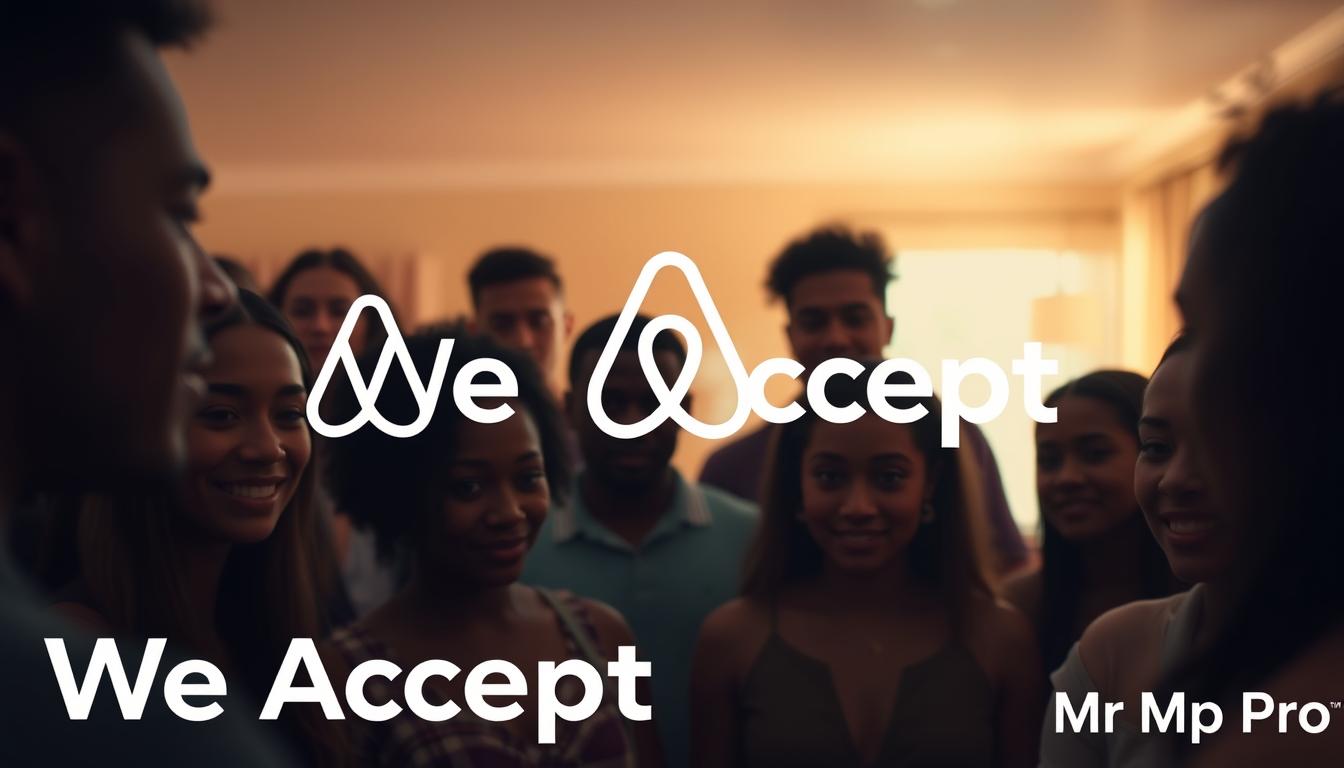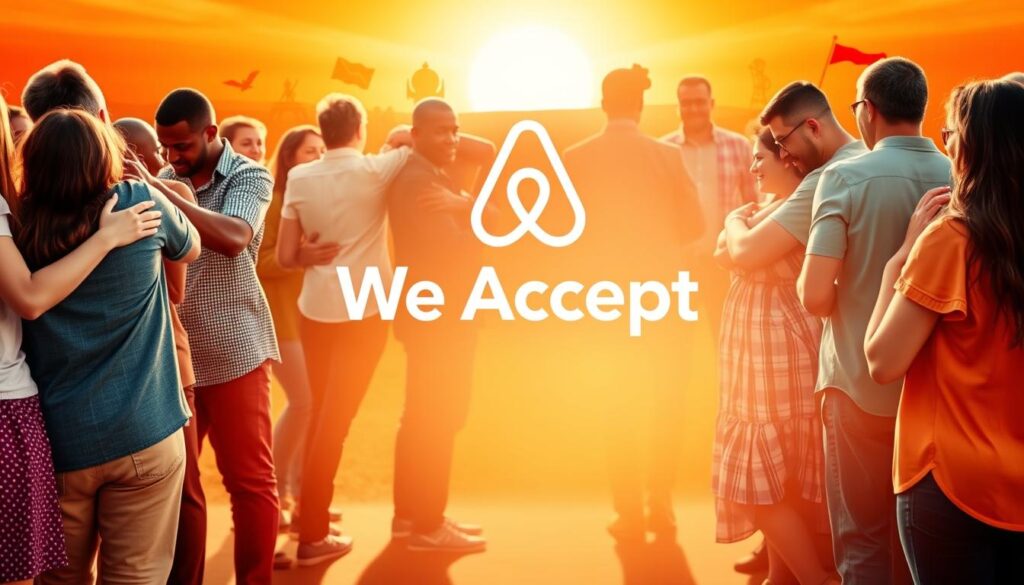
In 2017, a groundbreaking campaign emerged during a time of heightened social awareness. Airbnb’s #WeAccept campaign became a beacon of hope for many, showcasing a commitment to diversity and inclusion. This initiative was not just a marketing strategy; it was a response to growing concerns about discrimination within the platform.
At its core, the campaign aimed to address allegations of bias and promote unity. By featuring a powerful Super Bowl ad, the message of acceptance reached millions, sparking widespread conversation. The impact was significant: bookings increased by 10%, and brand sentiment improved by 20%.
What made this campaign truly remarkable was its strategic positioning. It aligned with a broader initiative where investments were made in organizations supporting marginalized communities. This effort not only enhanced the platform’s image but also encouraged a 15% increase in diverse hosts.
The success of the campaign was evident in its viral reach, with over a million views in the first day and 300,000 social media mentions in a week. It demonstrated how a company could turn controversy into an opportunity for positive change.
Campaign Origins and Context
In 2017, amidst a climate of heightened social and political tension, a significant movement emerged to address issues of inclusivity. This period was marked by growing concerns over discrimination, which set the stage for a pivotal response from the company.
Understanding the Social and Political Backdrop
Studies from institutions like Harvard revealed a 16% lower approval rate for African-American sounding names. These findings, coupled with reports from platforms like Engadget, highlighted systemic biases within the sharing economy.
Addressing Early Challenges and Discrimination Allegations
Users faced discrimination based on race, gender, and sexual orientation, leading to a public backlash. The company’s strategic shift was influenced by these allegations, aiming to restore trust and promote inclusivity. The campaign became a response to these challenges, marking a turning point in the company’s commitment to diversity and inclusion.
Airbnb We Accept Campaign
In 2017, Airbnb launched a powerful initiative to combat discrimination and promote inclusivity. The campaign was rooted in the company’s core values of belonging and respect for all individuals.

The Community Commitment Policy was central to this effort, requiring users to treat everyone with respect, regardless of race, disability, sex, or religion. This policy aimed to create a safe and welcoming environment for all members of the community.
Response to the 2017 Travel Ban and Activism
The campaign gained momentum during the 2017 travel ban, which targeted seven Muslim-majority nations. Airbnb used media and social media to spread its message of acceptance widely. The campaign addressed the problem of discrimination head-on, turning a crisis into a call for inclusivity.
By leveraging user-generated content, Airbnb showcased real-life examples of acceptance and belonging. This approach resonated globally, reestablishing trust within the community and enhancing brand reputation.
Execution and Marketing Strategies
The “We Accept” campaign was meticulously executed through a multi-platform approach, blending traditional advertising with dynamic social media strategies. This approach not only amplified the brand’s message but also ensured its reach to a diverse audience.
Multi-Platform Approach: Social Media, Super Bowl, and Beyond
Airbnb’s strategy was bold and far-reaching. The centerpiece was a 30-second Super Bowl ad viewed by 113 million people, making it one of the most-watched commercials of the event. This was complemented by a strong social media push, generating over 33,000 tweets during the first half of the Super Bowl alone.
| Platform | Reach | Engagement |
|---|---|---|
| Super Bowl Ad | 113 million viewers | N/A |
| Over 33,000 tweets | N/A | |
| Facebook and Instagram | 19 million video views | 90,000 shares, 500,000 likes |
The campaign’s success was further evident in its ability to engage both hosts and guests, emphasizing the value of belonging and fairness. This dual focus helped reestablish trust and enhanced the brand’s reputation.
“Inclusion is the foundation of our community, and this campaign was a testament to that commitment.”
By leveraging user-generated content and real-life stories, Airbnb created a relatable and authentic narrative. This approach not only resonated globally but also led to a 13% increase in website visitors from the U.S. and Canada in the week following the Super Bowl.
For more insights into how inclusivity drove significant engagement and brand value, visit this link to explore the campaign’s impact in depth.
Measuring Success and Impact
Measuring the success of a campaign involves more than just numbers; it’s about understanding the impact on the audience and the company’s values. For this initiative, success was gauged through a combination of quantitative metrics and qualitative feedback.
Evaluating KPIs and User Engagement
The campaign’s effectiveness was tracked using key performance indicators (KPIs) such as earned impressions, volunteer sign-ups, and website traffic. Here’s a breakdown of the notable metrics:
| Metric | Result |
|---|---|
| Earned Impressions | 87 million |
| Volunteer Host Sign-ups | 15,000 |
| Website Visitor Increase | 13% |
These metrics highlight the campaign’s broad reach and engagement, demonstrating how it resonated with the target audience.
Quantitative and Qualitative Outcomes
Beyond the numbers, the campaign fostered a sense of trust and commitment within the community. It not only enhanced the company’s image but also redefined public perception, showcasing a dedication to inclusivity. The widespread media coverage further amplified this impact, solidifying the campaign’s success.

“Inclusion is the foundation of our community, and this campaign was a testament to that commitment.”
For more insights into how inclusivity drove engagement and brand value, visit this link to explore the campaign’s impact in depth.
Comparative Analysis with Similar Campaigns
While many companies have launched inclusivity campaigns, few have made as significant an impact as Airbnb’s “We Accept” initiative. This section compares Airbnb’s approach with other industry campaigns, highlighting unique marketing strategies and their effects on customer engagement and business success.
Contrasting with Other Industry Initiatives
One notable example is Booking.com’s “Book the U.S” campaign, which aimed to promote diversity but took a more conservative approach. Unlike Airbnb, Booking.com focused primarily on traditional advertising without leveraging user-generated content or taking a bold stance on social issues. This difference in strategy impacted their engagement levels and brand perception.
Airbnb’s campaign stood out by addressing discrimination directly and incorporating real-life stories. This authenticity resonated deeply with customers, leading to a 13% increase in website visitors. In contrast, Booking.com’s campaign, while successful, did not achieve the same level of emotional connection or viral reach.
| Aspect | Airbnb “We Accept” | Booking.com “Book the U.S” |
|---|---|---|
| Strategy | Bold stance on inclusivity, user-generated content | Traditional advertising, conservative approach |
| Engagement | 13% increase in website visitors | Lower emotional connection |
| Reach | Millions through Super Bowl ad | Targeted but less viral |
The comparison highlights how Airbnb’s strategic planning and messaging differed, leading to greater business success and customer loyalty. By embracing inclusivity and authenticity, Airbnb set a new standard for marketing strategies in the industry.
Lessons for Future Campaigns
Every successful initiative offers valuable lessons for future strategies. The “We Accept” campaign teaches us about the power of aligning corporate social responsibility with authentic messaging. By addressing social issues directly, companies can turn challenges into opportunities for positive change.
Embracing Corporate Social Responsibility and Authentic Messaging
A key takeaway is the importance of integrating authenticity into strategic messaging. Using a unifying hashtag like #WeAccept can galvanize a global conversation, as seen with its impact on inclusivity. This approach not only resonates emotionally but also fosters trust and engagement.
Risk-Taking, Humanization, and Long-Term Brand Trust
Taking calculated risks can lead to significant long-term brand trust and success. The campaign demonstrated that maintaining consistency with core values while adapting to social change is crucial. Real examples of effective content and messaging drove positive change and broadened the campaign’s opportunity for impact.

“Authenticity and strategic messaging are the cornerstones of impactful campaigns.”
For more insights into how inclusivity and authenticity can drive engagement, visit this link to explore the campaign’s impact in depth.
Conclusion
The “We Accept” campaign stands as a testament to the power of inclusivity and corporate social responsibility. By addressing deep-rooted prejudices, the initiative not only transformed individual experiences but also redefined the brand’s relationship with its audience. At its core, the campaign’s success lies in its ability to turn challenges into opportunities, fostering a sense of belonging and respect for all backgrounds.
The measurable results are striking: 87 million earned impressions and a 15% increase in diverse hosts underscore the campaign’s broad reach and impact. Positive social media reactions, recognized by the Shorty Awards, further highlight its success. This effort demonstrates how strategic policies and authentic messaging can drive meaningful change.
For more insights into how inclusivity and social responsibility can shape brand success, explore this case study on the campaign’s impact. Additionally, discover how smart home technology is enhancing hospitality experiences by visiting this guide.

 Airbnb’s “We Accept” Campaign: Promoting Inclusivity Amidst Controversy
Airbnb’s “We Accept” Campaign: Promoting Inclusivity Amidst Controversy
0 Comment